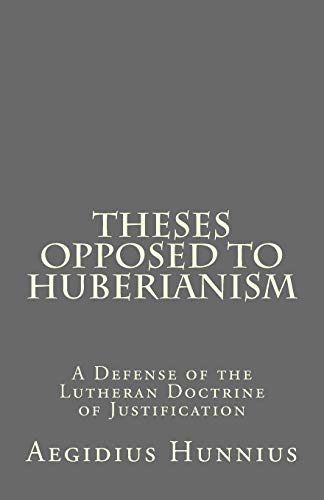Theses Opposed to Huberianism
A Defense of the Lutheran Doctrine of Justification
Aegidius Hunnius
BOOK REVIEW

In the world of theological debate, Theses Opposed to Huberianism: A Defense of the Lutheran Doctrine of Justification by Aegidius Hunnius emerges as a formidable contender, challenging us to revisit the very core of our beliefs and understanding of justification. A mere 72 pages, yet profound in its implications, this work invites readers into the austere and often convoluted corridors of Lutheran theology-where every word resonates with the weight of history, doctrine, and conviction.
At the heart of Hunnius's treatise lies an unwavering defense against the theology of Huber, who advocated for a version of justification that diverged from traditional Lutheran teaching. Hunnius, a luminary of the early 17th century, deftly dissects these new ideas, engaging in a fierce intellectual duel to highlight the necessity of faith, grace, and the transformative power of justification through Christ alone. His prose isn't just academic; it pulsates with the fervor of his belief, making it almost impossible for you not to feel the intensity of the struggle of faith versus reason.
Consider the historical context in which this work was penned. The Reformation, with its fiery debates and revolutionary ideas, set the stage for a theological renaissance. The stakes were high, and the battles fought during this era had ramifications that would echo through centuries. Hunnius's position stands firm: justification is not merely a doctrine; it is the lifeblood of the Lutheran Church and an essential tenet that distinguishes it from its contemporaries. It's a clarion call to the faithful, urging them to cling to their convictions amid a minefield of conflicting ideologies. Can you feel his urgency, the way he beckons believers to resistance against theological dilution?
Hunnius did not just aim to critique; he sought to enlighten. His writing challenges you to wrestle with complex theological disputes while simultaneously invoking the grace and mercy central to Christian faith. Critics and supporters alike have commented on the clarity and passion infused in his arguments. Some laud his precision and historical accuracy, while others find his perspective rigid, fearing it might stifle a more inclusive understanding of faith. These controversies serve to underscore the potency of his message-each opinion adding another layer to the discourse that surrounds his work.
Imagine standing at a crossroads of faith, where the roads fork into dogmatism and liberation. Hunnius positions you on the path of tradition, illuminating the dangers that lie in a more lenient interpretation of justification. This isn't merely an academic discussion; it's a fervent dance between soul and scripture. The book does not shy away from the harsh realities of faith. Instead, it confronts them head-on with vigor that is both stimulating and, at times, overwhelming. You may find yourself arguing silently with Hunnius, grappling with his assertions, questioning your own beliefs in the wake of his convictions.
Indeed, the emotional intensity of Theses Opposed to Huberianism ignites a fervor within its readers. This is not just a book of ideas but a passionate entreaty to recognize the implications of adopting a diluted theology. His words can feel like a challenge, nudging you to reconsider what justification truly means within a modern context-could it still hold the same weight in today's society, riddled with moral ambiguities and shifting ideologies?
As you delve deeper into the text, it becomes apparent that this work doesn't merely preserve a historical theological stance but also beckons you to reflect on your own spiritual journey. The echoes of Hunnius's thoughts resonate through centuries, reminding us that our interpretations of doctrine can significantly shape the very fabric of our communities.
In a world awash with half-truths and relativism, Hunnius stands as a stalwart defender of the robust, uncompromising truth of justification by faith. His treatise acts as both a bulwark and a beacon, urging you not to slip into complacency regarding your beliefs. The emotional rollercoaster that is his defense of Lutheran theology will leave you contemplative, even restless, pushing you to explore the depths of your faith with renewed vigor.
Ultimately, Theses Opposed to Huberianism is more than a defense of a doctrine; it's a passionate plea that echoes through the ages, compelling you to rethink your theological stance. The teachings, once firmly rooted in the past, continue to reverberate in today's discussions about the essence of belief and the transformative power of faith. Will you heed the call? The answer could very well define your spiritual landscape.
📖 Theses Opposed to Huberianism: A Defense of the Lutheran Doctrine of Justification
✍ by Aegidius Hunnius
🧾 72 pages
2012
#theses #opposed #huberianism #defense #lutheran #doctrine #justification #aegidius #hunnius #AegidiusHunnius